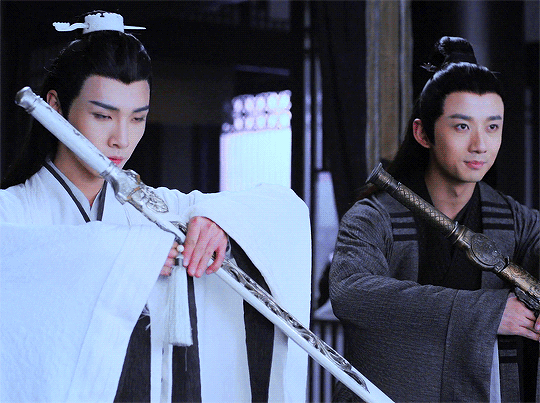Text
on translation (again), 知己, "soulmates", danmei, and cdrama subtitling
aka, cyan wanders off into the weeds and lies down to be swallowed by the earth because whatever.
almost two months ago, i made a brief impromptu salt post after encountering something frustrating at the end of a long day. i didn't actually want to have a conversation about it, but then everyone kept talking in the replies and i said fuck it and wrote like 7k words in an emotional frenzy before shoving it into my drafts because i couldn't stand to look at it anymore. but hey, i came back to it and did my best with whatever the fuck this ended up being, so here, have the full avalanche of only marginally organized thoughts. take it or leave it.
if you're new here, you may want to read my last big post on translation. there are two other posts linked at the beginning of that one which provide context. they will (hopefully) give you some idea of where I stand when it comes to translation as an art/practice if you don't already know.
i am also going to be blunt: those posts were made over half a year ago and i had a LOT more patience to spare back then for anglophone cdrama/danmei fandom. these days, i can't even browse fic for five minutes without losing my temper, so like. you know. fair warning, I am still trying to be kind, but I hit my breaking point sometime back in 2020 my dudes.
if you're still with me, cheers to u mate let's go
basically: at this moment in time, I despise "soulmates" as a translation for 知己 in the contexts of english subtitles for danmei live-action adaptations. when CQL first came out, I was neutral-critical of the translation--it wasn't what I would have chosen, but I understood why the choice was made, and it was tolerable to me in most cases. there are even certain situations where I still think it makes fairly good sense, ignoring metatextual concerns. however, approximately *checks notes* two years later and after the entrance of SHL onto the anglophone danmei cdrama fandom scene, I've revised that opinion to no, actually "soulmates" is bad and i hate it, specifically for how it's been picked up and misconstrued in anglophone fandom spaces and the consequences thereof. i swear to GOD if i had KNOWN how much psychic damage I was going to take because of this translation choice, I would have salted and burned the earth under it at the outset!!!! hindsight is 20/20 (ha) or whatever!!!
i know that that's a controversial take, but if you wanna hear me out, i shall continue forthwith beneath the cut
anglophone fandom goes fucking wild for 知己, from "omg and they were soulmates" jokes to screaming about netflix's summary for the untamed:
In a magical world of inter-clan rivalry, two soulmates face treacherous schemes and uncover a dark mystery linked to a tragic event in the past.
not gonna lie it was only funny the first few times haha yes indeed these two omg ~soulmates~ how did they get this past censorship etc etc. but now? i just find it aggravating. on particularly bad days, i have to put the internet down gently or I'll start crying.
look. i get it. there is a delight in seeing what feels like a daring flaunt of government restrictions, especially when it's something close to your heart, something close to your personhood. get wrecked, wangxian too gay for the censors etc. we cannot be suppressed. or, perhaps in more familiar terms, "we're here, we're queer, get used to it."
there's a flavor to the way a lot of these offhand comments and jokes about gay couples somehow "getting through" censorship in BL cdramas that makes me flinch when I see them. it's hard to pinpoint and describe--but maybe it's the lack of fear. chinese governmental censorship of the media is. not a joke, you know? there can be severe consequences for crossing the state. do you remember the case of tianyi? do you remember the disappearance of fan bingbing? do you remember li wenliang?
do you remember this post?
what troubles me about 知己 and "soulmates" in particular is how it's often held up as some kind of evidence of how brazen and cheeky the media in question is being--to the point where sometimes people will claim or imply that translating 知己 as anything other than "soulmates" is somehow queer erasure. that 知己 in the contexts of both CQL and SHL carried explicit romantic intent and to not encode that romantic tone within the english translation/subtitle would be, idk, the equivalent of calling wangxian and wenzhou galpals or whatever.
im. okay. im gonna be real with you right now. this just isn't fucking true. moreover, i find this kind of attitude to be such a shallow, one-dimensional approach to the politics of queerness in text, especially in the contexts we're dealing with here. this kind of rhetoric runs adjacent to painfully recent, american-centric chronically online discussions on representation and visibility in pop culture/media that I often find lack complexity and compassion. it feels intensely tied to the american culture of gay pride, the notion that being loudly, explicitly out is the best or only way to embody queer progress and that to do otherwise is, on some level, a betrayal. this isn't even a new conversation. here's a piece that appeared in salon from 1999 in which the author talks about his own misgivings about the culture and focus on pride. it's dated, certainly, but i can't pretend i'm not like. kinda depressed about the fact that so many of his points feel acutely relevant to me, almost exactly 22 years later.
you cannot measure chinese media with the same standards you might measure US (or UK or whatever) media because they are produced within very different cultural, political and historical contexts. being queer in the US or being POC in the US does not automatically give you a privileged understanding of the issues that surround the chinese media industry! i am fucking chinese-american and i had to do a lot of fucking personal work just to understand what little I do right now because it would be ridiculous to say that my heritage somehow gives me perfect access to the whole picture.
i don't. usually like to talk about my academic qualifications--most of the time I see people flexing on that front, I remain highly suspicious because well. look, I also have a college degree in Something Or Other and i was Not Impressed with like 80% of my peers. i know exactly how little you need to do to get a degree at a good, private university in the states. but I think it's tangential to my point, so: I come from an academic background that gave me access to a lot of knowledge and modes of thought which make me uniquely suited to talking about these sorts of subjects, and despite all of that, i still don't feel comfortable outright passing judgment on the majority of issues surrounding danmei fandom/media/etc. it fucking boggles my mind that there are some of you out here really trying to position yourselves as moral arbiters of something most of you can't even grasp in its original language, much less its rich cultural context. you may have noticed that my stance on almost everything is "it's complicated! here's what I believe i understand" so tbh the hubris on display is quite frankly astounding. my irritation with the "soulmates" effect is just a minor facet of *gestures* everything.
i know that the language i'm using is not particularly gentle. i hope you can understand and forgive me for having some ugly, vicious emotions after an ugly, vicious two years, both within fandom and without. i am not trying to punish anyone. i'm just. you know. running really low on good faith and patience.
i ultimately can't blame people for latching onto the soulmates translation--it's compelling, it feels unexpectedly explicit, and it was provided by "official sources" (oof). this is more an entreaty to spend a little more time thinking about some assumptions you may be holding or to reconsider your stances on a few things. maybe you'll ultimately disagree with me--that's fine. i don't want people to agree with me just because I said it, I want people to agree with me because they considered my words and judged them to be sound. but the fact still remains that 知己 isn't revolutionary or even particularly daring. you could call it capitulation and even that wouldn't be inaccurate. it is a socially acceptable way to label an intimate bond between two men in stories, platonic or otherwise. of course they're 知己. it's not the use of 知己 itself that makes an onscreen relationship more or less explicitly romantic but the context of the rest of their interactions. 知己 has multiple valences, and to pretend or assume that the romantic one is the only relevant reading of it is an oversimplification that I feel devalues both the depth of the term itself and, more broadly, love that does not take a romantic form. at its core, 知己 is about intimacy--in many shapes and at many levels.
before i continue, please read @hunxi-guilai's post about 知己 and how it can vary in meaning and gravity depending on context. I'm gonna quote the paragraphs that are particularly relevant to my points here because no offense, i don't trust anyone to read anything or put in the effort to meet me halfway anymore.
first:
People seem shocked when 知己 zhiji is a term dropped in casual conversation or daily dialogue, and they really shouldn’t be; it is as weighty or as casual as someone makes it in the moment. It is a living, breathing word that is actively employed in vernacular vocabularies, not some ancient artifact only pulled out and dusted off for the most significant/dramatic of occasions.
and second:
In the 《天涯客》 audiodrama, Zhou Zishu calls Wen Kexing a zhiji just for noticing that he’s sunning himself on the street (because Wen Kexing is the only one who sees through Zhou Zishu’s disguise at that moment, and doesn’t take him for a beggar). At that point, they haven’t even exchanged a single word, and Zhou Zishu remarks to himself that he hadn’t thought to meet a 知己 zhiji. He makes no more of it than that–just the acknowledgement oh, someone understood me, before moving on with his day.
i think problems arise for a few reasons.
1) a lot of people just do not understand translation from a practical standpoint, which I blame on a combination of flawed education systems and a failure to apply critical reasoning to situations involving translation. i think this is definitely a problem in the US specifically--that's the public education system I grew up in and have personal experience with, and I can say that with a fair amount of confidence. because of this, I see a lot (and i mean a lot) of people insisting on one-to-one translations of terms, concepts, etc. there is a lot of concern with "accuracy" and "what's the correct/proper translation for x then". if you read my last series of posts on translation that i linked up at the beginning of this post, you may have noticed that trend and my frustrations with it. this is less an issue with "poor" or "bad" translations themselves, but with how people have learned (or perhaps, not learned) to interact with translations.
2) a related issue to point 1 is that beyond not understanding the basic complications inherent to all translation is the subsequent (predictable) lack of understanding regarding different types of translation and how different branches of translation will prioritize different things entirely and implement completely different techniques. literary translation is very different from legal translation, which is very different from subtitling for mass market release, which is different from academic translation, which is different from comics translation, which is different from video game localization, which is different from machine translation, which is different from live interpretation etc. etc. etc. this is a problem not only for laypeople but also for professionals who work in translation industries that have little to no interaction with other types of translation. a professional legal translator isn't automatically qualified to talk shit to me about literary translation (and vice-versa) because we have fundamentally different goals, philosophies, and concerns. furthermore, translation as a trade vs translation as an art require different knowledge bases and skills--I'm a terrible medical interpreter, but an excellent literary translator.
3) so put these two gaps in general knowledge together, combine them with an explosively growing fandom, two languages that are notoriously difficult to translate between, the unfortunate political snarl surrounding the source material, then add a dash of tumblr-twitter university-flavored social justice rhetoric, a heaping metric fuckton spoonful of sinophobia, and you get the unfortunate, "知己 EQUALS SOULMATE IF YOU DO ANYTHING ELSE IT'S BOWING TO CENSORSHIP STOP ERASING QUEERNESS FROM MEDIA" take.
is this a (somewhat unkind) hyperbolic representation? i mean, yeah. but please remember, this take also manifests in things like "then what's the proper translation for 知己 [or any other complicated term]?" and "but 知己 is a way of getting around the censors by implying romance, right?" and "well, how do you keep the original [romantic] meaning of 知己 in translation then?" and "omg they really said soulmates" and "CQL/SHL said SOULMATE RIGHTS" and "wangxian/wenzhou are soulmates 😭😭😭😭" and, as i've stated, my least favorite: "CQL/SHL said fuck the censors they're soulmates".
these are fairly innocent on their own--like I said, despite the very serious digression i took up there, I get it. I understand the impulses, I understand why it's fun, but when it piles up and gets repeated over and over, it starts to wear. just. please think twice before idk, hinging entire premises on the misconception that two characters are "canonical soulmates" or making yet another fucking censorship joke or hot take that i personally have to see. stop using chinese state-sponsored censorship as a prop in your bids for internet clout and/or self-absorbed political agendas projected onto fictional characters.
okay.
with that said, i guess now it's time for some more regularly scheduled cyan programming: obsessive opinions about translation choices.
besides often finding online fandom's current preoccupation with explicitly stated queer representation simplistic and uncompassionate or whatever, I also, for petty, personal reasons, just think it's just such an unbelievably boring and unimaginative way to engage with language and literature--with the power of things that are left unsaid, with subtext and subtlety! yes, there is great power and value in explicit statements, but there is also power in the implicit. the wholesale dismissal of anything less than open declarations results in, i think, some pretty hollow takes (and some seriously lackluster writing).
so what are the artistic reasons for why I don't want to see "soulmate" for 知己 anymore?
as hunxi explained in her post, 知己 is a term that changes meaning and gravity depending on context and situational usage. just as it can be used with great significance, it can also be a totally casual thing. taking into account the tendency for fandom at large to think of translation as a one-to-one equivalency, when you consistently translate 知己 into "soulmate" you end up with... issues.
i think this is specifically due to its immutable register--"soulmate" is an inherently weighty term, something that is not true for 知己. furthermore, "soulmate" is likely to carry a romantic connotation in english, which, once again, is not true for 知己. this leads to, I think, a lot of misunderstanding and analytical mistakes when discussing both CQL and SHL, because even if people do understand that it's not an exact translation, there's still a persistent belief that 知己, like soulmate, is inherently weighty and sometimes almost explicitly romantic.
let's talk about CQL and SHL to illustrate my point. that's why most of you are here, isn't it?
CQL first. ep 25. the godforsaken iconic 知己 exchange.

[ID: screenshot from episode 25 of the untamed during the 知己 conversation. lan wangji and wei wuxian face each other in profile. there are no words onscreen. /end ID]
this bitch.
here is the original dialogue:
LWJ: 你把我当成什么人?
WWX: 我曾经把你当作我毕生知己
LWJ: 現在仍是
there are numerous translations of these lines--both netflix and youtube (as of 15 june 2021) render 知己 as "confidant":
netflix:
LWJ: Who do you take me for?
WWX: I once treated you as my lifelong confidant.
LWJ: I still am.
youtube:
LWJ: who do you take me for?
WWX: I had once taken you as my whole-life confidant.
LWJ: Still, I am.
however, the version that I know most people latch onto/are familiar with is the one where wei wuxian's line is subtitled as something like, "I once saw you as my soulmate of this lifetime". if I remember correctly, the WeTV subs originally had this, as did netflix. the episode description of 25 on wikipedia notes that "Wei WuXian answers that he used to treat Lan WangJi as a soulmate." other instances of 知己 are also now rendered as "confidant" (or "true friend" in one instance), but you can see some of the original translations in screenshots collected in this tweet from december 2019.
on the off-chance that the tweet is moved/deleted, here is a screenshot of the images in question:

[ID: four screenshots from the untamed with different pieces of dialogue that include the term "soulmate". /end ID]
top row, left to right are from episodes 7 and 25. the bottom row is two moments from episode 43, in case anyone is insane like me cares. yes i did pull that almost entirely from memory rip my brain storage space
if I were forced to keep soulmate for at least one instance, i would pick the bottom right scene in 43, where wei wuxian remarks: "人生得一知己, 足矣." // "to have a 知己 in one's lifetime, that is enough". unless i'm forgetting another instance, i would argue that this is wei wuxian's weightiest use of the term throughout the entire series: this is in the present-day arc (so after *handwaves* all that trauma), lan wangji just stood beside him publicly and declared his loyalty on the steps of jinlin tai in front of the most prominent figures in their sphere, we're getting close to the resolution of the plot, and wei wuxian has just learned about lan wangji's punishment, aka the depths of his devotion. to go a little deeper, this is a quote from 20th century poet lu xun and is written in an elevated register. putting aside that this is a 20th century literary reference in fantasy ancient china (but then again: there's really no point in trying to "accurately" date CQL. you may as well try to "accurately" date game of thrones), i think the register is meaningful because wei wuxian moves between registers depending on context, but in everyday speech, is most likely to sit comfortably in a colloquial range. an elevated register carries significance for him, unlike lan wangji for whom this is the norm. (yet again: see hunxi's post on linguistic register in CQL for the rundown on that)
this is in stark contrast to the moment in episode 7 depicted in the top left image. wei wuxian and lan wangji have just presented the yin iron to lan xichen and lan qiren and explained their little adventure at the cold springs. wei wuxian speculates on how everything is connected and lan xichen confirms his reasoning and adds, "Wangji, when you asked me before, I couldn't reveal the truth to you." wei wuxian, realizing that he and lan wangji have had the same thoughts about the situation, goes, "哟,知己啊", which basically means "hey, we're 知己!" if i really wanted to capture the tone of this little interjection, i would say the mood is closest to something like: "yo, we totally vibe/we're on the same wavelength/you get me/samesies!" etc etc. this is about as casual as you can get--it's literally just 知己, prefaced by a particle that's roughly equivalent to "hey/yo/oh!" and followed by an auxiliary particle to express a mild sense of enthusiasm.
you can make an argument to use "soulmates" again in this situation. after all, it's not unusual to hyperbolize semi-ironically in english-- "yo, we're totally soulmates" or "hey, soulmate alert" etc. I don't think these specific (exaggerated) examples are appropriate for CQL for obvious reasons, but i think that, in a vacuum, subtitling this as, "hey, it's like we're soulmates" could work.
HOWEVER, as I said before, im now anti-soulmate and I Would Prefer Not To, so let's explore that.
as established, 知己 can naturally vary in gravity, while I personally don't feel that soulmate does. so in order to keep the "soulmate" translation, I think you have to create a reading of tone that's not exactly true to the character in the moment. if someone says, in a situation like this, "yo, it's like we're soulmates", it's understood that there's an irony to it. they're exaggerating for effect, etc. this isn't necessarily OOC for wei wuxian in general, but I don't think it's true to what's happening in this specific scene and more importantly, to the purpose of the 知己 motif throughout CQL. I believe that 知己 is being used earnestly, if lightly.
the 知己 motif is a CQL-only choice; it is not present in the mdzs novel. the use of 知己/知己-adjacent dialogue (i.e. dialogue concerning familiarity, recognition, understanding, insiders vs outsiders) over the course of the story is one of the ways that I think CQL was trying to illustrate a subtextual relationship that would be accepted by the censors. because it is a motif, I understand why we would want to translate the term with some degree of consistency in order to preserve its purpose.
i believe this hinges on the way that 知己 can naturally vary in tonal weight from very light to very heavy: it's anything from "hey! we vibe" to "you are the only one who truly understands me". to use "soulmate" as a blunt, one-to-one equivalence is a) bad because of my earlier points about how translation is never a one-to-one etc. and b) not to my taste specifically because "soulmate" lacks this natural fluidity, so even if you can make interesting artistic choices by varying the sincerity of how "soulmate" is used (as i showed a few paragraphs up), I think this has a subtle but profound effect on the way wangxian's relationship is presented.
CQL wangxian are quite different from mdzs wangxian in a number of ways, but what's relevant here is how their relationship has a much more fated/meant-to-be flavor to it in CQL rather than in mdzs. from the beginning, CQL emphasizes their special connection, even if neither of them has fully come to terms with those feelings. wangxian's first moonlit duel is way more of a big deal in CQL than in mdzs, for example. other examples include: their tagteam adventure in the cold springs with lan yi; their symbolic forehead ribbon marriage; the lantern scene; meeting songxiao and emphasizing their special connection; the emotional farewell in the rain; i could go on. this is a very different relationship to wangxian in the novel, in which wei wuxian is really so caught up in his own problems before his death that the bulk of wangxian's relationship is actually built up and reciprocated during the present-day arc instead. which i prefer!!!! but that's neither here nor there.
"but cyan!" i hear you saying, "surely that means that soulmate is a good translation? what is a soulmate if not a fated/meant-to-be person??" to which i say, HERE'S MY REBUTTAL: to use "soulmate" as a catch-all translation for 知己 changes the axis upon which the relationship moves. instead of gravity, it becomes sincerity. and this, I think, is not a good reflection of what 知己 (and related dialogue) is meant to convey throughout CQL.
one of the personality traits of wei wuxian that CQL doubles down on is how seriously he takes the important things, regardless of what kind of outer demeanor he presents. jiang yanli says to jiang cheng within the first few episodes that "you know that a'xian never fools around when it matters". that doesn't mean he doesn't have fun! he still buys the 天子笑 liquor when he goes to fetch the invitation from caiyi after all. he likes to mess around, he likes to play tricks and he is blessed with a light heart. but we see over and over again, even as a schoolboy, that he is sincere and heartfelt about important things. once again: see the lantern scene.
to me, I think this is enough reason to step back from trying to use the "soulmate" translation because it necessitates that kind of hyperbolic/ironic tone in english in that moment in episode 7, when I think it's actually narratively salient that wei wuxian is being earnest. this is especially important for one of the first uses of 知己 in the story. 知己 grows heavier with each subsequent use as CQL progresses: it goes from something casual to something much more significant, but I don't believe it's ever used ironically--as i said, i believe the thematic axis is gravity. if we confine ourselves to using "soulmate" as a one-to-one translation for 知己, we inevitably hit snags because the terms just do not function the same way.
"well, ok cyan, then what the hell are you proposing we do instead" you all fucking ask me because heaven forbid i complain about anything without providing an itemized list of proposed solutions
after thinking about it for a really long time, i think my preferred solution is actually fairly simple--instead of trying to translate 知己 as a rigid, one-word noun, just... translate what it means.
if you don't already know, the two characters that make up 知己 are 知 "to know" and 己 "self". so someone who is 知己 can literally be described as "one who knows me". i think that to know and to understand are both english verbs that have the same natural weight variance as 知己. you can, completely sincerely, say both "oh yeah, I know her," and "but i know her" for very different effect. i think that with some work and thought, you could come up with subtitles that not only circumvent the problem of reinforcing one-to-one translation tendencies and the misconceptions that those tend to breed, but also preserve the intended thematic throughline and are an acceptable length for actual subtitle timing and encoding.
this post is already way too fucking long, but in for a penny in for my entire life savings i guess: one of the considerations of subtitles that tends to get ignored or forgotten, especially in fansub territory, is timing and relative length. good subtitles must both convey meaning well and convey it in a length that an average viewer can absorb and understand in the time that it is onscreen. fansubs play fast and loose with this because there's no concern over the idea of capturing and/or maintaining an audience. for the most part, fansubs are for people who are already fans. plus, there's (theoretically) no money/profit involved. for media corporations, this is going to be a much bigger concern--capturing and maintaining an audience is critical to profit. and we all know how much people hate subtitles generally anyways (especially in anglophone countries :)), so they had better be a) clear and b) easy to access if you want to keep your viewers.
this is a significant challenge for chinese -> english subtitles because of the way the languages work. i talk about this at length in my post on lan wangji's speech patterns and the difficulties associated with rendering them into english. if you'd like to see an example in action, here's a screenshot of my aegisub workspace for the SHL special ending easter egg subtitles:

[ID: screenshot of the subtitling program aegisub, displaying a segment of an episode. in the CPS column, a few lines are pale to medium red. the line displayed is "Will Senior please offer critique!" for 请前辈指点 /end ID]
honestly, not too bad! my worst character per second (CPS) ratio is 23CPS, which is the first line.
but look at this screenshot from my aegisub workspace for HIStory3: Trap, episode 1:

[ID: screenshot of the subtitling program aegisub, displaying a segment of an episode. in the CPS column, several lines are medium to bright red. the line on display is "Another division says they can snatch him away, so they just snatch him," for 别的单位说抢就抢 /end ID]
god the hilarity of seeing HOW LONG the english is compared to the mandarin. if you look at the numbers, you may notice that i have a 49CPS and also a 39CPS line right next to each other. that is Bad! this was a personal project, so I was unconcerned. however, this would be unacceptable for official, mainstream release subtitles.
netflix's guidelines for english subtitles are publicly available online. if you scroll down to the sections on reading speed for english subtitles for foreign language source material (II.17), you will see that netflix's standard for adult programs is 20CPS. and i hope by now it's clear why that can be such a bitterly challenging metric to meet in a show like CQL.
this is not to defend the netflix subtitles. or the wetv ones. they're absolutely fucking abysmal, even by the standards laid out in the netflix style guide. I could pick through the document and point out every way in which I believe the CQL subtitles laughably fail to meet the standards (and the infuriating consequences thereof), but that's another post for sure. there is some leeway for "industry requirements" but I'm getting real tired of this excuse when it's clear that the real problem is a) the people in charge of the subtitles simply don't care enough/don't pay enough for good subtitles and b) subtitling/specialized translation isn't really considered a serious, difficult art that requires creative skill to be done well. it's truly fucking enraging.
what i'm trying to do by really driving down on all of these minute details is to hopefully (!!) prompt people into shifting their paradigms re: translation/subtitling and more fully understand how simple misconceptions driven by singular translation choices can ripple out into complex and unexpected forms, harmful or not. i am well aware that the amount of thought, time, energy etc. that I've put into this One Translation Choice is completely unfeasible as a mainstream standard. it's obviously ridiculous! but I think there is a middle ground somewhere that wouldn't have caused so much unintentional damage. "soulmates" is the tip of the goddamn iceberg. (every time i see a one-character name, i feel another piece of my soul crumble away)
for CQL specifically, I've gone back and forth between whether I would prefer using "to know" or "to understand" as the fulcrum of the 知己 translation, and I... think..... I would go with "to know". at least right now. there are a few reasons for that tentative choice, one of which is simply that "know" is only four characters while "understand" is ten. the other is that, after messing around with both in each scenario, I think "know" ultimately flows better sonically.
i'm only going to break down the exchange in episode 25 because i'm exhausted, but here:
ep 25:
LWJ: 你把我当成什么人?
WWX: 我曾经把你当作 [new line] 我毕生知己
LWJ: 現在仍是
there are actually a couple things with this exchange I want to talk about in addition to 知己. first: the way that lan wangji's first line is subtitled: "who do you take me for?"
this is a poor translation because it has absolutely the wrong tone in english. "who/what do you take me for?" is an idiomatic, rhetorical question, that's usually followed by something derogatory. one of the more common forms you'll see is "what do you take me for, an idiot?" it's not appropriate for this serious, vulnerable question that lan wangji is posing.
a much better translation, in my opinion, would be "who am I to you?" which also has some pretty specific connotations in english. it doesn't have to be romantic, but it does often appear in romantic scenarios where someone wants to know where they stand in relation to another. this, i think, gets you the hint of romantic intention that feels appropriate in this scene without the heavy-handedness of "soulmates", and also just. more accurately reflects lan wangji's intentions.
(an aside: i speculate that the reason we got "who do you take me for" is because the chinese sentence structure more or less literally translates to something like "you have taken me for/regarded me as/made me into what kind of person?". depending on tone, you can use it in the same way as "who do you take me for" in english, but unfortunately, that's not what's happening here. it seems like a very unsurprising mistake for a machine translation.)
so the 知己 line. this one is HARD because it's long! and the subtitles split right before 毕生知己 because wei wuxian pauses. I think the power of the line rests in keeping the answer wholly after the pause. the original was, I think, "I once saw you as [pause, new subtitle line] my soulmate of this lifetime."
ugh!! it's so awkward and weird, ESPECIALLY following a "who do you take me for" GOD. here's my proposal:
I once thought you were someone [pause] who would know me for a lifetime.
it's long!! yes it's long, but we have a little wiggle room because there's a lot of heavy silences during this exchange, so we might actually be able to make the CPS limit. or almost. what the fuck ever. I could shorten it further by just saying "I once thought you [pause] would know me for a lifetime" but this is the wrong form of answer for the question "who am I to you?" so I think it's worthwhile to keep "were someone" despite how many characters it adds.
and lan wangji's final response (yes, I have thoughts on this too): we have both "I still am" and "Still, I am". I feel strongly that "Still, I am" is better than "I still am" because lan wangji being lan wangji is using a more formal construction. the 仍 character he's using for "still" is usually literary. putting "still" at the front of the sentence creates a more elevated tone in english, and emphasizes it, which more closely reflects lan wangji's intention.
NOW HOWEVER, if we are going with my dialogue proposals, I would say that we should change this to "Still, I do" because the relevant part of "someone who would know me for a lifetime" is the knowing and the implication in that is "i don't know if you know me right now" or "i don't know if you will actually know me forever" or "you knew me once, and i thought it would be forever, but now I'm not so sure". so i feel that lan wangji's response should be to that implied uncertainty, even if it shifts the grammar a little. I do still know you. I know you right now.
putting it all together, my proposed dialogue would look like this:
LWJ: Who am I to you?
WWX: I once thought you were someone [new line] who would know me for a lifetime.
LWJ: Still, I do.
DO YOU SEE WHY I THINK THIS IS BETTER THAN SOULMATES. what's powerful about this scene is what isn't being said! it's the tone! it's the fucking reaching out and trying to cling to someone you're afraid you're in the process of losing. fucks sake. what is more intimate than really knowing a person? i hate everything. soulmates my ASS.
all right, let's pivot to SHL, which presents a different set of challenges with its use of 知己. there are two exchanges involving 知己 that I think are particularly noteworthy: once in ep8, the moment we all remember when wen kexing says it, and once in ep30, when jin-wang says he had always thought zhou zishu was his 知己.
in these two lines in SHL, there is an emphasis on 知己's function as a title/role, whereas in CQL I think there's more room to bend the structure of the dialogue around 知己 without losing sight of its original purpose. both of the lines in SHL use 知己 in direct contrast to another, lesser term: in wen kexing's case, he's saying, "you only think of me as a friend? after all this? but I think of you as 知己". jin-wang, on the other hand, is saying, "I always thought you were my 知己, but it seems you're nothing more than an ordinary person". it's much harder here to try and retain the punch of the parallel structure of these moments without the use of a shorter, one-to-one translation: "friend" vs "someone who understands me", and "someone who understands me" vs "ordinary person"--they're such unequal length that I think the overall structure starts to get clunky, especially in episode 30 when it's all said at once. the mandarin has an elegance because each term is two characters: 朋友 (friend),庸人 (mediocre/ordinary person),知己
since i never met a translation challenge i didn't charge at headfirst screaming, let's give this a shot. why the hell not.
here's my problem with using "soulmates"--even though I think it does work in episode 8, it really doesn't in episode 30. i think the reason the moment in episode 30 produces such a visceral recoil is because it's using a term that's perfectly appropriate in the social context, but still feels like a desecration because of how that term has been given a different meaning through the rest of the show. as it is right now, the translation "soulmates" feels like a distraction from the intensity of the moment because it doesn't really fit--again, it's the romantic connotations of soulmate that are making things difficult. jin-wang very obviously does NOT mean 知己 in a romantic context (though that can be a valid and fun dynamic to play with in fic etc.) this is a much closer to a patron-minister manifestation of the 知己 relationship, and it centers around ideals, politics, shared vision etc. (for background on this aspect of 知己, please avail yourself of one of hunxi's posts if you're unfamiliar with it idk look, hunxi just has a lot of backlog i can conveniently cite ok)
when I read "soulmate" on the screen it took me right out of the moment--it's such an out-of-place term for the situation! i think it diminishes jin-wang's charisma a lot because it sounds so... laughable?? idk. in any case, jin-wang is beiyuan's ex and I Would Llike To See It
so what i'm looking for is a one-to-one translation that can work in both scenarios, and after a lot of thought on this front, the best I've been able to come up with in english is "kindred spirit". if I were forced to give a general one-to-one translation of 知己 for all-purpose use, this is what I would choose as well. but again, it's far from perfect. I would just prefer it over "soulmates" or "bosom friend" or what the fuck ever as a catch-all.
anyways, episode 8:
WKX: 你怎么不问我当你是什么?
ZZS: 管你当我是什么
...
WKX: 是 知己
YT subs:
WKX: Why don't you ask me what I think of you?
ZZS: I don't care.
...
WKX: You're my soulmate.
my proposed alteration:
WKX: Why aren't you asking how I think of you?
ZZS: Who cares how you think of me.
...
WKX: I think of you as [new line] my kindred spirit.
episode 30:
JW: 孤王还一直以为 [new line] 你是我的知己 [new line] 原来 [new line] 你也只是个庸人而已
YT subs:
JW: I always think [new line] you are my soul mate. [new line] But it turns out [new line] that you're no more than an ordinary person.
my proposed alteration:
JW: This lonely prince had always thought [new line] that you were my kindred spirit [new line] But it seems [new line] you were nothing more than another ordinary person.
i... want to do explanations of my choices, but I really am running on nothing but fumes at this point. the only thing I want to mention, I think, is the prince's use of 孤王 as a pronoun. most of the time, when speaking with zhou zishu, he refers to himself as either 本王 or simply, 我. i did a quick check, and i'm fairly confident that 孤王 carries the connotation of solitude/loneliness. it's not an uncommon pronoun (for royalty), but I think it's important that he switches to this one in this moment when he laments that he and zhou zishu aren't what he had once hoped they could be.
if I were translating only for myself, I would probably still try to somehow work with "someone who understands me" because I think that just hits harder than "kindred spirit". so like, "I think of you as someone who understands me" and "This lonely prince had always thought that you were someone who understood me", that kind of thing. i think it gets more precisely at the core of what makes 知己 such an important concept in SHL. but i did think it was worthwhile to show how one might translate 知己 in a different context while restricted to a one-to-one term, just as proof of concept. we can have better subtitles that still meet style guidelines. yes, this is fueled by my own bitterness and spite. im fucking tired of the excuses for piss-poor subtitles when the problem clearly is one of value, not possibility.
so where does this leave us, at the end of approximately 7k (yikes)? i... talked about a lot of things, so if you made it all the way to the end, congrats and thanks for sticking with it. i've been trying to figure out how to end this post since i started it, and I haven't found a good answer, but I'll try.
in early 2013, I met a lesbian activist from china at a conference. she was there with a small delegation, maybe about five young queer people, who worked in beijing, or maybe shanghai--it's been a long time, and I don't remember most of the details. what I do remember was that I was anxious, that I still didn't feel comfortable with a label, and that I was at least half-convinced I was faking whatever queer mishmash of feelings I had going on. and I remember that these were the first queer people from china i had ever knowingly met. they talked about the work they were doing, their own coming out experiences, the antagonism and support they'd received--the woman I spoke to mentioned that they had a lesbian print magazine publication, and I naively asked after the presentation if there was any way they could mail it to someone overseas (me) who was interested in reading it. she hesitated somewhat apologetically and said, "well, no, not really. it's still an illegal publication, you see. we can't distribute like that." this was nearly six years before the webnovelist tianyi was sentenced to a decade in prison for printing and distributing her BL work.
in august 2020, about a year after CQL aired, the organizers of shanghai pride announced that they were halting all activities indefinitely after 11 years. new laws instated early this year on self-publishing are increasing restrictions on free speech.
something a little closer to home: you remember 227 right? do you remember some of the cold, callous reactions to the news? like this one? what about the incessant trickle of hot twitter takes that all seem to start with "I know censorship is bad, but"?
at the end of the day, perhaps this is just my sad, tired entreaty once again to think more about how you interact with stories in translation, how complex the act of translation can be. before you blithely make jokes about chinese media censorship and how shows "get around it" based solely on your view through the small and cloudy window of low-quality subtitles, i ask you again to take a moment to reflect. before you tweet a thread about how even though censorship is bad, it forces creativity and produces interesting art, all while holding up misinterpretations of those subtitles as evidence--look, i don't give a fuck. the hays code produced interesting cinema too. many terrible things produce interesting art.
on a more personal note: before you start a fucking dissection of a language you don't understand on my personal vent post, before you barge into someone's askbox with this entitled attitude about language, before you ask any of us to act as your personal tour guide without doing us the basic courtesy of a five second google search, before you try to impose culturally ignorant moral judgments on the text, just. take a minute.
this post is as much a summary of my feelings on 知己 and translation as it is a messy, bitter reaction to the straws that are this close to breaking the camel's back. how many times must i reiterate that translation is not and never will be uncomplicated and bloodless before you all stop demanding easy, simple answers? stop asking me to exploit a culture I barely feel belongs to me for your fanfiction. stop asking me to gut myself to make your media more palatable.
i don't have a coherent thesis for this post. i don't want to have a debate. make your own post if you want to have a discussion because I really don't.
as i sit here staring at all the places where I revised my words to be softer, where i put a disclaimer asking for forgiveness, i debate undoing it all and speaking as harshly as i feel. why should i have to disclaim my emotions every time I have them? why should I have to make everyone comfortable when I have been trying with every fucking fiber of my goodwill to be gentle this whole time, only to be backstabbed, insulted, used, talked over, dismissed? must even my anger be eloquent to be valued? what do i need to be forgiven for?
i miss finding joy here.
#from the bottom of my heart#I hope we can both stop taking psychic damage from being in spaces we used to love
2K notes
·
View notes
Note
not a question, and I'm sure many people have expressed similar sentiments but anyway – just binged the mdzs novel recently and absolutely love reading your posts on it! especially with regards to language stuff, I'm probably considered fluent but mostly picked things up by osmosis rather than Actual Education so seeing things like registers and wenyan articulated is satisfyingly fun in the "yes!! that!!!" way. anyway thanks for the great posts, hope you have a nice day/week/rest of year ahead!!
(high fives in osmosis)
I am glad you enjoyed my posts, anon! even if they have like, the most tangential relationship to the original novel, much like the show itself (one of these days I will read OG, I suppose, now that I have Unlocked the ability to read webnovels in Chinese, also MXTX's writing style is hilarious). regardless, thank you for the love, and for stopping by!
78 notes
·
View notes
Photo
an AU where mingjue is like i'll drink for him and snatches the cup out of his hands i need it
@baoshan-sanren your mind???
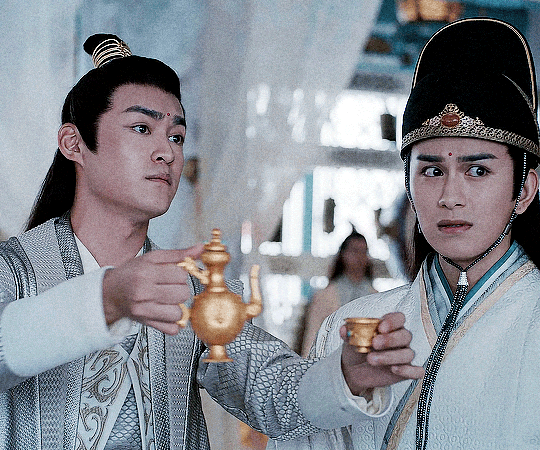
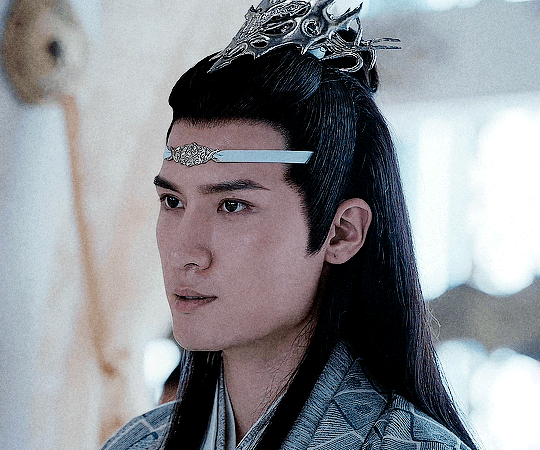
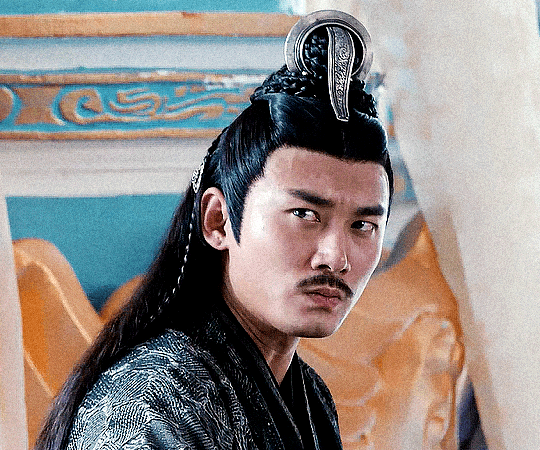
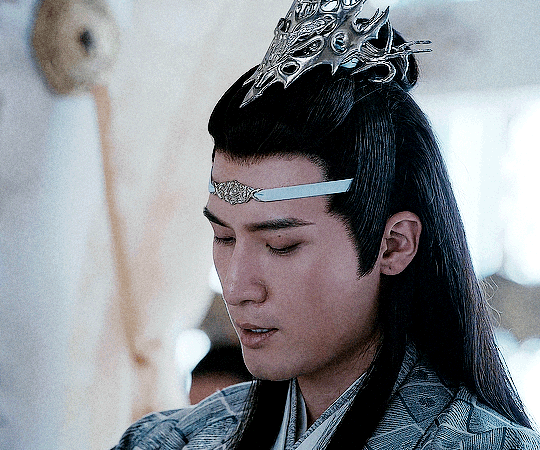
episode 26
1K notes
·
View notes
Photo

… with two rabbits!
672 notes
·
View notes
Text
I'd love, support, and defend this man like I'm getting paid for it.

#I am at all times ready to throw down on behalf of Liu Haikuan#also I love this jean jacket look#cql bts#Liu Haikuan
1K notes
·
View notes
Text

606 notes
·
View notes
Photo


I still, I still
[image is an ink painting of lan xichen in profile, eyes closed and tilting his head up slightly with a bereft expression on his face. stylized yellow peonies are painted in metallic gold ink sprouting from him and filling the space around him. following is a photograph of the same painting, showing a chinese ink stone and brush laid on top of the paper.]
#it's Lan Xichen loving hours all day every day on this blog#OP the METALLIC GOLD INK THOUGH#I also think that Lan Xichen should be showered in flowers#cql fanart#Lan Xichen#I love
5K notes
·
View notes
Photo
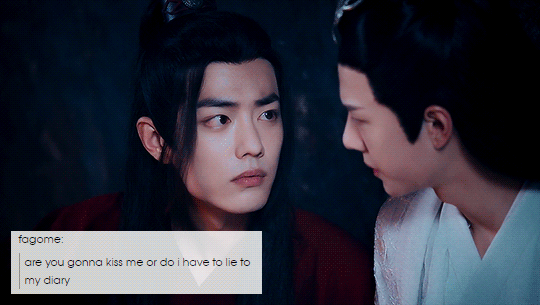
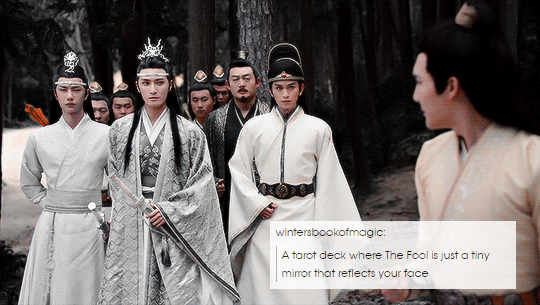


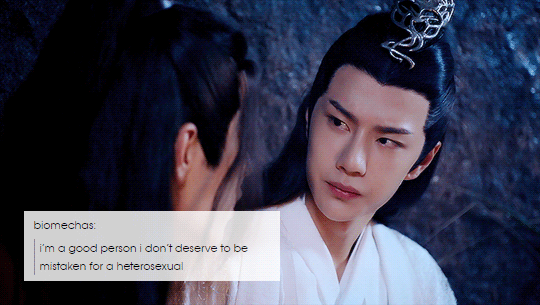

the untamed x random tumblr text posts 1/?
2K notes
·
View notes
Photo
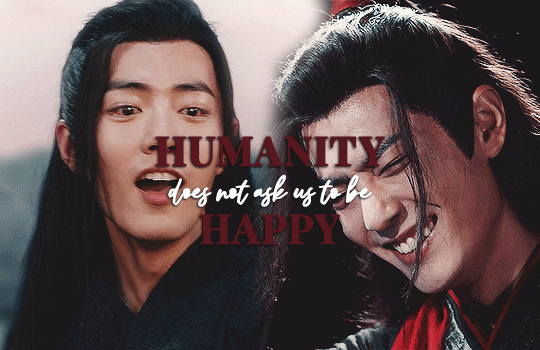


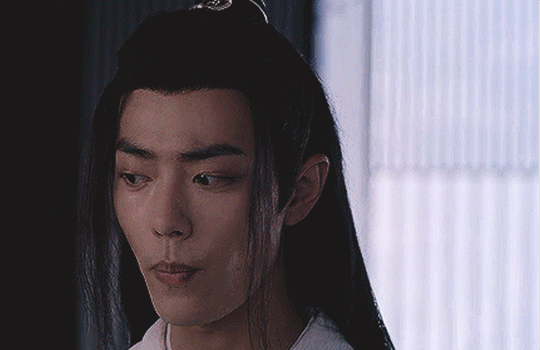
“Survival first, then happiness as we can manage it.“ - Ender’s Game by Orson Scott Card
WEI WUXIAN from THE UNTAMED (2019)
↪for @creatorsofcolornet‘s event 4: characters of color
576 notes
·
View notes
Text
DEATH IS A ONE WAY STREET BUT THAT DIDN'T STOP ME FROM COMMITTING ONE HELL OF A TRAFFIC VIOLATION
59K notes
·
View notes
Photo

jc’s threats are the biggest comfort to jin ling, you cannot change my mind
+bonus supportive juniors :)

#(slams fist into table) THIS IS THE CONTENT I WISH TO SEE IN THE WORLD#multi-clan duckling contingent#mdzs fanart#Jiang Cheng#Jin Ling
1K notes
·
View notes
Photo
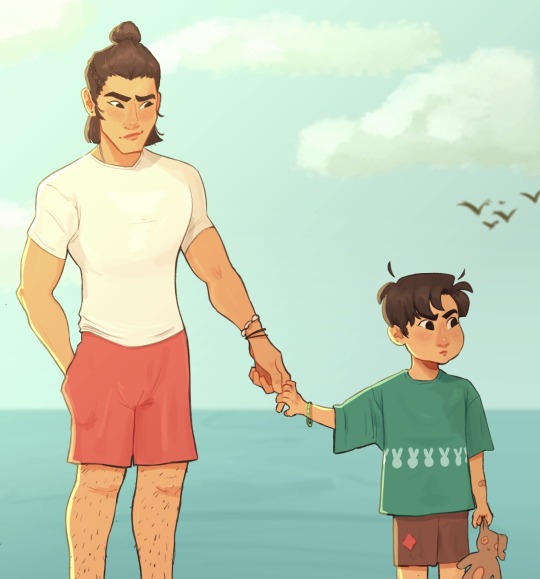
modern au where single big bro lxc take cares of his kid brother lwj (lilo and nani style you feel)
#yesssss#YESSSSSS#mdzs fanart#Lan Xichen#Lan Wangji#have I mentioned that the twin jades own my entire heart
2K notes
·
View notes
Note
So like... if an animated corpse can be a “ghost”, how are these guys not “wizards”? wtf is a “cultivator”? Am I a dick for being annoyed by this?
yes
474 notes
·
View notes
Photo



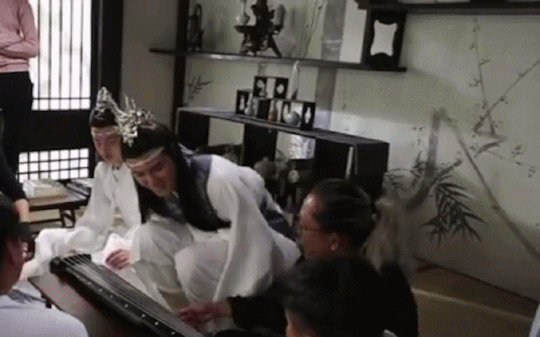
Lan Da showing his little didi some fingering guqin techniques
XXX
#haikuan-ge qiuqiu ni-a#给我们留一条活路 好吗#without that outer layer Lan Xichen's costuming looks MUCH more like Lan Wangji's wow#cql bts#Liu Haikuan#Wang Yibo
2K notes
·
View notes
Photo
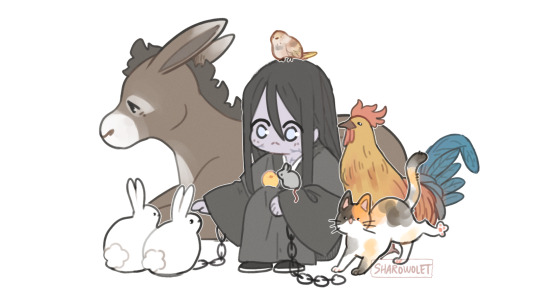
wen ning & friends :3
[ Twitter ] [ IG ]
#(slams fist into table) and he! deserves! all! of them!#truest disney princess Wen Ning#mdzs fanart#Wen Ning
2K notes
·
View notes
Photo

Of course I would sketch my favorite too.
#oh HECK yes#(Anthony Ramos voice) now that's what I'm TALKING ABOUT#mdzs fanart#Jiang Cheng#very sexy framing you've got going there
199 notes
·
View notes

